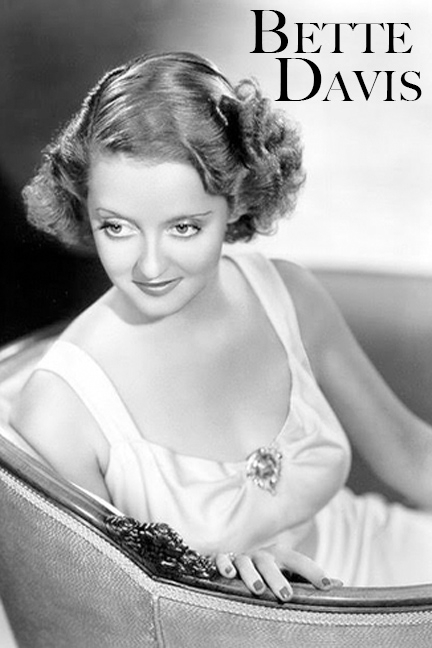

My grandmother was a Bette Davis impersonator.
Not professionally, and barely amateurly, either: She only entered, and won, a single look-alike contest, well before my time. But previously, and forever after, she'd played up a natural resemblance — the eyes, of course, but also the less-remarked-upon nub-tipped nose — by styling her hair like Davis' too: perilously side parted, raked stringently across, with an anti-climactic finale of stubborn, tiny curls. It helped that she was so short.
Hilariously — that is, if you watched FX's mini-series The Feud, or have even a passing familiarity with pop culture lore — she named my mother "Joan."
She claimed it was because she'd passed her one pregnancy — "I'm never doing THAT again!" —"binge-watching" (as we'd call it today) Crawford's films. Sure enough, my mother went on to sprout very bold eyebrows (which I inherited), and long, lovely legs (which I did not. I was stuck with grandma's, which were as undistinguished as her idol's. Had the Allies relied upon hers and not those of that other Hollywood "Betty" — Grable — to inspire masculine morale during World War II, I'm pretty sure Hitler would have won.)
I, however, have reason to suspect malice.
Because my grandmother was not a pleasant woman. Cold, vain, cheap, fussy and tactless, far fonder of her friends — of which she had, to me, a shockingly high number; my mother regularly mused about selling tickets to her funeral — than her own family. To whom she could be, frankly, a bitch.
That's the rap on Bette Davis, too, of course.
That Davis was a bitch in real life seems beyond dispute, and even excusable, at least professionally: Her perfectionism and Yankee work ethic, combined with her peerless talent, single-handedly (and thanklessly) rescued at least one movie studio from bankruptcy.
However, it is her screen persona that I'm addressing now, and here the "bitch" aspect is lazily overstated.
In a 1963 review of Davis' autobiography, The Lonely Life, Brigid Brophy compares it, approvingly, to that of St. Teresa of Avila — and, in a common trope of the era, disapprovingly to the much later memoir of another St. Teresa, the "Little Flower" of Lisieux. Contemporary Catholic scholars have since ably rehabilitated Therese of Lisieux's grossly unfair image as a simpering, sentimental doormat, aided no doubt by the West's contemporaneous discovery of Zen Buddhism, which the "Little Flower" seems to have been accidentally practising after a (19th century French bourgeois) fashion.
And it is Therese's renowned devotion to carrying out unpleasant duties, and facing an agonizing early death, not just perfectly and uncomplainingly, but also with a smile, that is displayed in more of Davis' onscreen portrayals than is generally allowed.
Forget, for a moment (and if such a thing is even possible) the harridans of The Letter, In This Our Life, The Little Foxes, and Whatever Happened to Baby Jane? and, of course, her breakout role in Of Human Bondage.
And notice how frequently her characters in other films are obligated to course this particular gauntlet:
A Sin (hers or somebody else's) compels her to keep a Secret and make terrible, noble Sacrifices, all the while Suffering Silently, both physically and emotionally, as said Sacrifices go unacknowledged and misunderstood by those around her.
We first glimpse this Bette Davis in the last acts of Dangerous and Jezebel, but she soon starts showing up in second acts, and even bits of the firsts — as soon as the movie can get the Sin bit out of the way — in Dark Victory; The Old Maid, The Private Lives of Elizabeth and Essex; All This, and Heaven Too; The Great Lie (the title says it all); Old Acquaintance; Winter Meeting and Now, Voyager.
Thankless duty is the fuel of melodrama, and that body of work is a veritable ANWR of the thing. Despite that, the selfish, scheming Davis "bitch" is the one we remember — shooting her lovers until the gun clicks empty, or "best" of all, watching them die of protracted heart attacks as they beg her for the medication within her reach, but not theirs.
Even when she isn't really a bitch at all — surely Margo Channing of All About Eve is simply a diva (and, it turns out, justifiably paranoid) which is assuredly not the same thing. (Although a lesser actress could have easily mouthed Mankowitz's dialogue to evoke the former.)
We never did sell those funeral tickets when my grandmother finally died at age 93, having survived strokes, heart attacks, cancer, and being hit by a speeding truck in her 70s, having blithely strode into heavy traffic, convinced that, naturally, the oncoming cars would quite simply deign to stop for her.
On the topic of inheritances, we were, like two negative magnets, far too much alike to ever get along. But we could always talk about Bette Davis. My grandmother never tired of recalling the thrilling scene in Jezebel, when the eponymous character defies Southern belle convention and scandalously wears a crimson dress, not a virginal white one, to the Olympus ball.
"It was red!" my grandmother enthused. "Bright, bright red!"
Jezebel, of course, is black and white.
